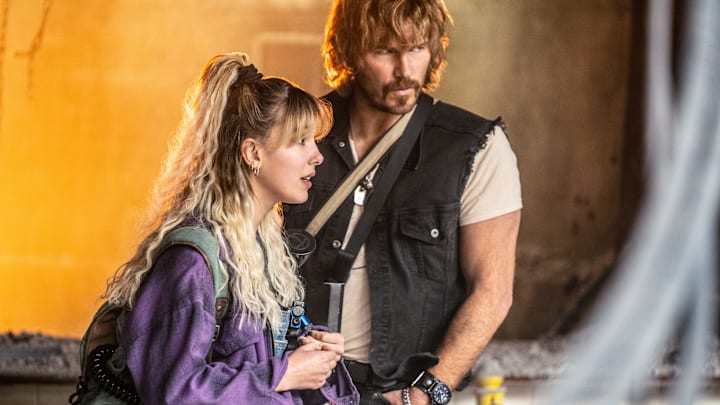The Electric State, for all of its star power with leads and the directors, crashes and burns as yet another movie about robots and AIs taking over the world and the remaining human revolutionaries that aim to end its hold on reality. The Electric State makes it easy for audiences to understand. In the early 1990s, robots were created to do jobs that people were not interested in doing. They were created to help. But, over time, they grew to have their own hopes, dreams, and professional aspirations that went beyond what humans had created them to do. Starting a revolution, robots went to war with the humans in a plea for their own lives. Still, in the film's primary setting of 1994, robots have been outlawed and have been left adrift. Sentre, a technology company, had risen as the hero of the war, creating a robotic suit that could be entirely controlled by humans to protect people during the war.
The movie's main plot comes into focus when Michelle, who had been under the impression that her entire family is dead, comes face to face with a robot claiming to be her younger genius brother, Chris. The robot is able to give enough information for Michelle to eventually trust that Chris is controlling the robot from a remote location and thus begins her journey to find him. Still, the film does not really get going until Michelle meets John, an unlikely ally.
This Netflix film aims to question if hurting one person is justifiable for the greater good of the world. For as much as it may be curious in this quandary, The Electric State is more interested in quickly naming those using Chris' comatose body as villains and having them attempt to defend their choices than it is in actually exploring the ramifications of those decisions. The movie ends almost immediately after the world is clued into the idea that Sentre's technology is entirely reliant on a boy taken hostage. The Electric State is also not as interested as it should be in the robot mentality, attempting to shoehorn in early on that the robots are aiming for equality among humans and then making their decisions surrounding a failed revolution, where the peace treaty that it resulted in still has the robots not being a part of main civilization. The robots are not given much of a catalyst or motive for their early decisions, as the film is more interested in portraying the war conflict than it is in seeing the robots actually work toward a sense of self-identity.
Rather than desiring to become memorable for something, The Electric State settles for being just watchable to make it through to the end. However, there are still some moments that seem out of place, such as how John's hair is cut toward the film's end for no real reason at all. While the moment is likely meant to reference his empathy for the robots following a particularly brutal destruction of their home environment, there is no real payoff to it, especially as John had been a robot ally to begin with. There is no actual character development from this decision as The Electric State is not even suggesting that John had a particularly close bond to his hairstyle for any significant reason.
Having Chris Pratt as one of its leads and Anthony and Joe Russo as the directors, The Electric State is nothing close to the joy that comes from some of the Marvel Cinematic Universe's greatest hits. Its main cast tries to elevate the film, as Millie Bobby Brown works to show a girl desperate to reunite with and save her brother, Chris Pratt leans into the initially unwilling protective adult figure, and Stanley Tucci works to make the villainous Ethan Skate a dangerous antagonist. The film's voice cast also provides the necessary emotion to allow the idea that these robots have real personalities. Still, The Electric State struggles to say anything new or different about robots or AI than other television shows or movies. Does this movie want audiences to believe in and trust AI technology because there are kind robots? Does this movie want audiences to be against AI technology because of the hold it can have on the human mind? The Electric State does not even spend enough time with Ethan Skate to discuss if a person's wrongful choices in the name of saving the world can lead to a corrupt mindset, as the film chooses instead to make Ethan Skate appear as a one-note evil character than a layered villain.
The Electric State is not difficult to sit through with a runtime of a little over two hours. Its use of action sequences and eventual reveals can keep the viewer engaged enough to hope that the film improves as it continues. It also makes good use of preventing the robots from being unrelenting villains with no purpose, choosing instead to present them as underdogs. While The Electric State had plenty of potential with an interesting premise, it ultimately could not live up to the story it wanted to tell.
